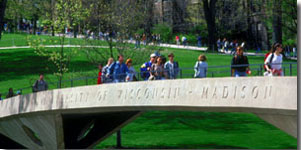| |
 |
|
|
Vol. 74, No. 6, June 2001
|
University of Wisconsin Law School
Curriculum
Philosophy
Building an understanding of how the law relates to the outside world
has long been a focal point of the University of Wisconsin Law School's
curriculum. That educational philosophy, dubbed in the early 1900s as
"law in action," pervades the law school's teaching approach, whether
it's in classroom discussions of the law's impact on people's lives and
on society as a whole, in skills training courses that emphasize learning
through simulated case work, or in clinical programs providing students
direct experience with real clients' legal problems.
 Being
the state's only public law school affords a special challenge, according
to dean Kenneth B. Davis Jr. "We see our mission as serving the entire
spectrum of law students," Davis says. "Some of our graduates may end
up in large corporate law firms on the East or West Coast; others may
return to their hometowns in Wisconsin to join a small practice. We may
have a greater mix of career expectations among our students than many
other law schools. We want to provide something for all our students,
wherever they may be going." Being
the state's only public law school affords a special challenge, according
to dean Kenneth B. Davis Jr. "We see our mission as serving the entire
spectrum of law students," Davis says. "Some of our graduates may end
up in large corporate law firms on the East or West Coast; others may
return to their hometowns in Wisconsin to join a small practice. We may
have a greater mix of career expectations among our students than many
other law schools. We want to provide something for all our students,
wherever they may be going."
The first-year curriculum exposes students to an array of general law
courses. But the setting differs in a key way from the stereotypical large-lecture
law school class. First-year students take one course with a small group
of 20 or so classmates, rather than the usual group about triple that
size, which offers a couple of benefits. "First," Davis notes, "it provides
a greater opportunity to work on specific skills and to engage in give-and-take
on legal issues, which you don't necessarily have in a huge class. And
second, it provides an important socialization process" that helps ease
the transition into law school.
In the second and third years, students can opt to further explore any
of several legal areas: criminal law, environmental law, labor and employment
law, international and comparative law, intellectual property, and more.
"Someone once looked at the number of different courses various law schools
offer," Davis reports, "and we were toward the top of the list. That didn't
surprise me because we're responding to that mission I referred to earlier."
Clinical programs are available to students after completion of the
first year. The Frank J. Remington Center is the umbrella for nine such
projects. The prosecution and defender projects involve work in public
defender and district attorney offices around the state; the seven remaining
projects entail legal services to prison inmates and other institutionalized
persons, health care patients, crime victims, and residents of disadvantaged
Madison neighborhoods. All projects blend classroom and clinical components.
"I think if you ask students what they learn best from clinical experiences,
by far and away they'd say interviewing, counseling, and speaking to real
clients," says Remington Center director Meredith Ross. "I think another
skill they learn that they often don't recognize is how to deal with messy
facts - those ambiguous facts that develop as you move along in a case."
In addition to the Remington Center programs, the law school has five
other in-house clinical programs - the Legal Defense Program, Center for
Public Representation, Family Law Clinic, Consumer Law Litigation Clinic,
and Great Lakes Indian Law Center - plus nine internship/externship programs,
ranging from judicial internships to working with various advocacy organizations
in Wisconsin and elsewhere in the country.
Another approach to skills training is embodied in 17 skills-oriented
courses. The most comprehensive of these is the 15-hour-a-week general
practice skills course taught by Ralph Cagle, director of the general
practice skills program, plus a corps of 80-some lawyers Cagle recruits
from around Wisconsin, and even from out of state, to help teach the course.
Cagle notes the "generous spirit" on behalf of practicing attorneys who
make this program possible. Visiting instructors pay their own transportation,
and each receives a $50-per-day honorarium for usually a four-day commitment.
"The goal is to teach law students what lawyers really do," Cagle explains,
"and the only way to do that is through lawyers who really do those things.
We cover client interviewing, counseling, negotiating, drafting, oral
advocacy, problem solving - the range of skills that lawyering is about."
Who's
Getting In? 
|
